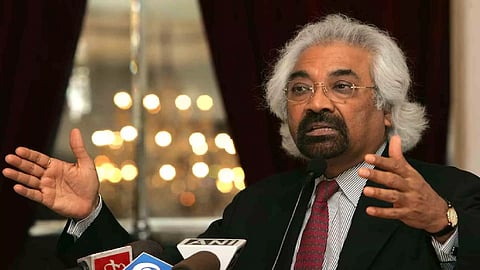

This might not be the best time to invoke the name of the King of Pop. But going by the righteous outrage exhibited by fellow citizens, who have been bracketed to a narrow spectrum of ethnicities by the once-undisputed evangelist of our telecom revolution, Sam Pitroda, it might be safe to say the Congress is certainly not humming, “If you're thinkin’ about my baby, it don't matter if you’re black or white.” Pitroda, an advisor to former PM, the late Rajiv Gandhi, recently earned the finger-wagging ire of everyone — from the ruling party’s high command, to the tedious troll on Twitter who have been riled up over Pitroda's choice of racial identities like Chinese, Arabs, Whites and Africans used to describe Indians from different parts of the country.
As the political firestorm brewed, the Congress distanced itself from Pitroda’s words as ‘unfortunate, unacceptable’. Nudged by the party leadership, Pitroda stepped down from his cross-continental perch as the Chairman of the Indian Overseas Congress, possibly to avoid any further chagrin to the GOP mothership. On terra firma, Prime Minister Modi led the charge as the BJP mounted a full-scale assault on the chief opposition, asserting that ‘we will not tolerate the attempt to insult Indians on the basis of their skin colour’. The irony of segregation based on complexion is not lost on a populace staring at the prospects of people being singled out on account of being branded as ‘infiltrators and those running relief camps for producing children.’
Digressions aside, Pitroda’s remarks have arrived fresh off the boat of yet another faux pas that took place in March when Taiwan’s Labour Minister Hsu Ming-chun said in an interview regarding the planned recruitment of Indian migrant workers, that the Ministry would initially focus on recruiting workers from northeastern India because ‘their skin colour and dietary habits are closer to ours.’ The Minister issued an apology for her remarks which were construed as racist, but not before New Delhi informally conveyed to Taipei its displeasure over the gaffe. While it might be customary to reprimand those in the public eye, mainly politicians for such off-hand, ‘innocent’ blurt-outs bordering on racism, India is still wriggling to break free of its cocoon of homegrown apartheid ideology.
This March, Kalamandalam Sathyabhama, a 66-year-old veteran Mohiniyattam artiste triggered a row among Kerala’s cultural cognoscenti when she passed denigrating remarks against a Chalakudy-based Dalit male dancer RLV Ramakrishnan, by disparaging his complexion, and saying that he looked like a crow. The community came together in solidarity, led by Mallika Sarabhai, Dancer and Chancellor of Kalamandalam, and expressed their angst on the continuing reverence for such Stockholm Syndrome-esque appropriations of beauty as handed down to us by our ‘fair’ colonial benefactors. A few artistes also called out this inherent racism as the roadblock that was preventing Dalit artistes from getting their dues. Sadly, this transpired in the land that inspired the forbidden romance between the untouchable Velutha, and the Achayathi Ammu in Arundhati Roy’s The God of Small Things.
Not to belabour the point, but we must acknowledge the role played by skin tone in Tamil society. We’ve had leaders here anointed with sobriquets like Karuppu MGR, as well as songs that said Karupputhan Enakku Pidicha Colouru (Black is my favourite shade). And we love our heroines, and our heroes, like our coffee. Enough said.